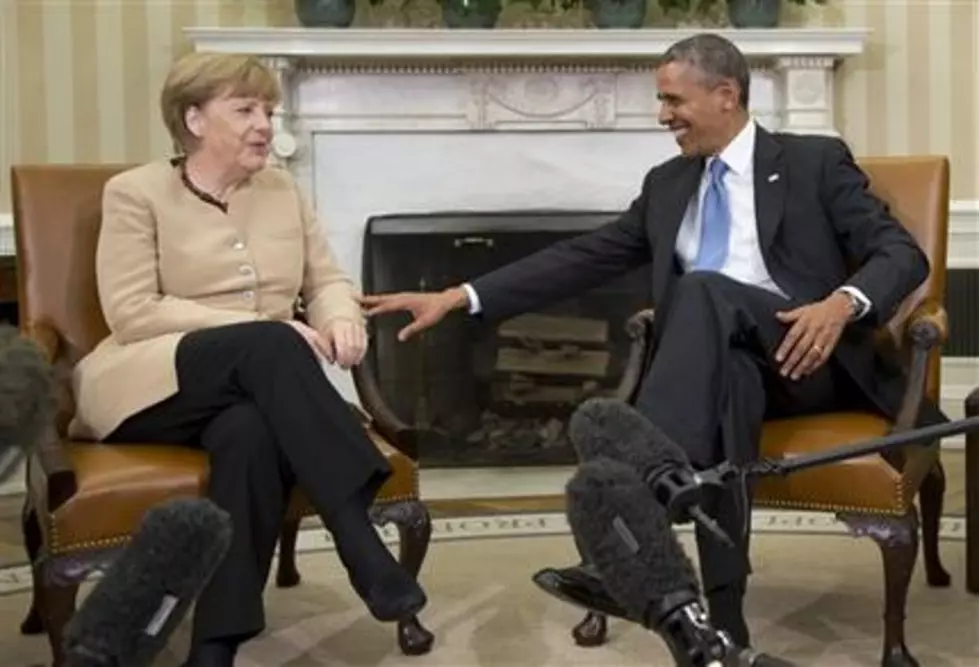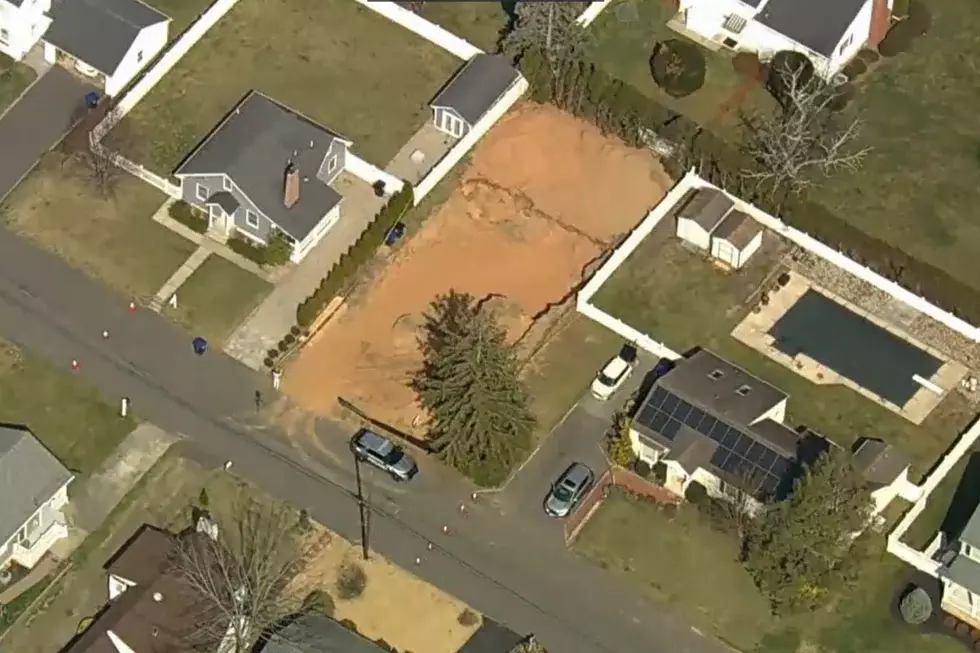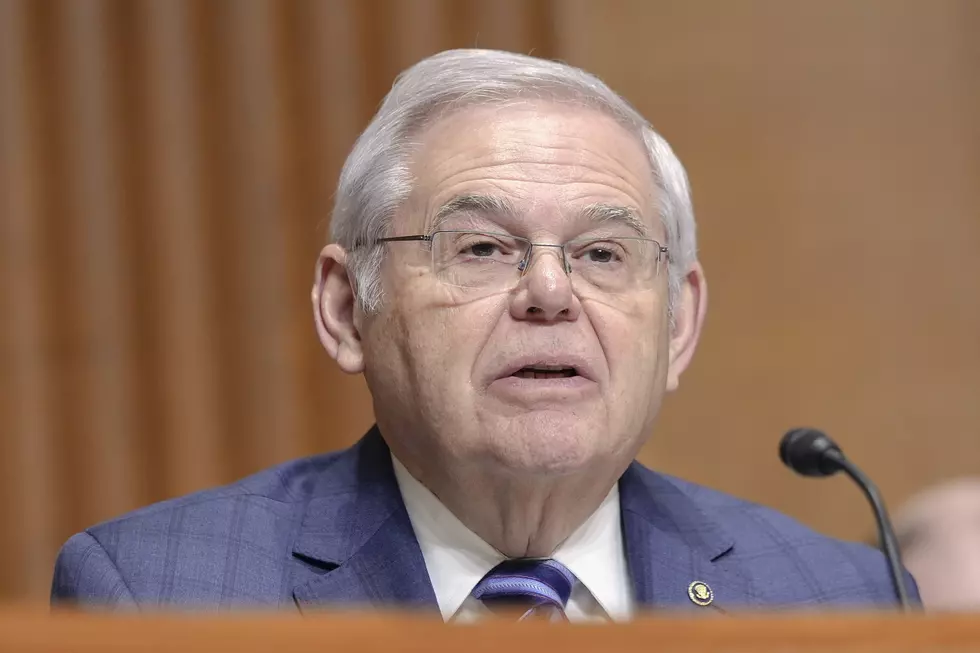
Obama, Merkel Displaying Unity on Russia
President Barack Obama and German Chancellor Angela Merkel mounted a display of trans-Atlantic unity Friday against an assertive Russia, even as sanctions imposed by Western allies seemed to be doing little to change Vladimir Putin's behavior toward Ukraine.
Days after the United States and the European Union slapped Moscow with a new round of sanctions, Merkel arrived at the White House for meetings and a working lunch with Obama. The German chancellor came buoyed by a decisive re-election victory late last year but facing pressure from all sides as Europe seeks to show resolve against Russia on Ukraine without harming its own economic interests.
Sitting side by side in the Oval Office, Obama and Merkel chatted quietly as reporters were briefly allowed inside at the start of their meeting. The two leaders were holding a joint news conference later in the Rose Garden.
As the crisis in Ukraine has worsened, Merkel has spoken to Putin, the Russian president, perhaps more frequently than has any other European leader. Because of this, the U.S. sees her as a critical channel of communication, as well as a key player in the effort to prevent other EU nations from going soft on sanctions.
"There's no question that the situation in Ukraine, the continued failure by Russia to abide by its commitments in the Geneva Agreement will be a focus of the conversation," White House spokesman Jay Carney said.
The two leaders met as the European Union announced it would hold talks with Ukraine and Russia later this month on the price of natural gas, an attempt to avoid any disruption in supplies. Moscow recently hiked the price of gas shipped to Ukraine to $485 per thousand cubic meters from $268.50, and threatened to limit deliveries if Kiev does not meet the new price and repay a debt of $3.5 billion.
More forebodingly, pro-Russia forces shot down two Ukrainian helicopters Friday and Ukraine reported many rebels dead and wounded as the interim government in Kiev launched its first major offensive against an insurgency that has seized government buildings across the east.
The Kremlin said Kiev's offensive against the insurgents "destroyed" the two-week-old Geneva agreement on cooling Ukraine's crisis.
The diplomatic deal struck two weeks ago in Geneva has failed to de-escalate the conflict between pro-Russian separatists in eastern Ukraine and the central government in Kiev. The U.S. and Europe have sharply rebuked Putin for flouting his responsibilities under the deal, and Moscow on Friday declared all hopes for implementing the accord "effectively destroyed."
U.S. and German officials said ahead of the Obama-Merkel meeting that part of the discussion probably would focus on how the U.S. and Europe would coordinate harsher punishments - including sanctions targeting broad sectors of Russia's economy - should Moscow further provoke tensions in Ukraine, such as by sending military forces into restive eastern Ukraine. The White House is concerned that Europe's deep economic interests in Russia and dependence on Russian energy could deter EU nations from following through with sanctions that could ricochet onto their own economies.
"She's getting enormous pressure from German industry not to harm their interests," said Heather Conley, a Europe expert at the Center for Strategic and International Studies. "She has to start laying the political groundwork for this because it requires some sacrifice."
Merkel, like Obama, has ruled out military action to deter Putin from seizing more of Ukraine. Sen. John McCain, R-Ariz., who has urged Obama to send weapons to Ukraine's government, said he planned to tell Merkel during a private meeting that he was embarrassed but unsurprised by her country's failure of leadership.
"The leaders, they're being governed by the industrial complex of Germany," McCain said Thursday. "They might as well have them in the government. It's shameful."
A troubled EU-U.S. trade agreement, known as the Trans-Atlantic Trade and Investment Partnership, is also on the agenda, as well as joint efforts to deal with climate change, Syria's civil war and nuclear negotiations with Iran, said Laura Magnuson of the White House's National Security Council.
But the German leader may also be bringing her concerns over U.S. spying programs - an issue that's continued to erode the U.S.-German relationship despite Obama's assurances that the National Security Agency would stop eavesdropping on Merkel's cellphone. The issue has aggravated German citizens, prompting calls for Berlin to strike some type of agreement with Washington to limit U.S. surveillance on German soil.
Another potential wrinkle: A German parliamentary panel probing the NSA issue is eager to invite former NSA contractor Edward Snowden to speak to the panel. The German government has made clear it opposes the idea of letting Snowden, whose U.S. passport has been revoked, testify in Berlin, drawing criticism from the opposition.
Merkel will also speak to the U.S. Chamber of Commerce on Friday, focusing on the fledgling trade agreement and U.S.-European economic ties.
More From New Jersey 101.5 FM









